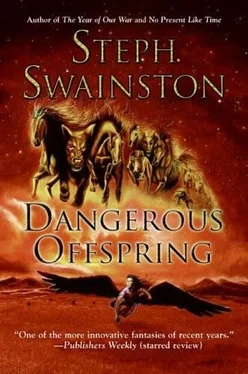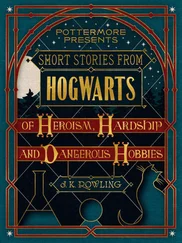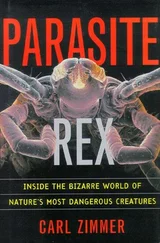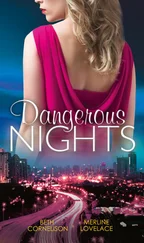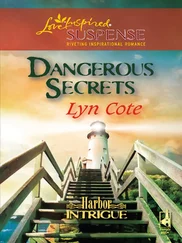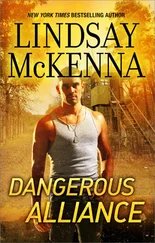I landed, picked it up then ran to find the path, kicking up clouds of spores from puffball fungi. The stalks of bluebells on the bank were invisible; their flowers hung in the air like fine eye-shadow dust. Silky beech leaves were unfolding like fans from the buds, ferns uncurled like green question marks, up from the ground covering of dog’s mercury and herb robyn.
I knocked on the door of Chalybeate Chase, one of Lightning’s picturesque and immaculate hunting lodges. I have a delightful privilege as Messenger: I can ask for lodging anywhere. It always amuses me to see great lords scrambling to give their best suites to a junkie ex-street kid. The caretaker’s surprised face appeared in the doorway.
I held up the goose and he broke into a grin.
Every centimetre of Chalybeate Chase’s inside walls was crammed with hunting trophies. The table, where I was sitting to eat my roast goose dinner, was a glass-fronted cabinet containing a display of stuffed wildfowl. Hundreds of deer heads surrounded me, mounted looking left and right to fit their antlers into every available space. Pink and orange paper chains draped all over them-the debris left by Lightning’s last party hadn’t been cleared up yet. He has a habit of announcing that it is his birthday at random intervals. Sometimes he has two or three in a year, sometimes none for a decade. The first time he asked me to deliver invitations I thought it really was his birthday until Rayne explained it was nothing but an excuse for a party and no one knows when his real birthday is. According to Lightning, immortals’ birthdays don’t count.
Next morning I headed out of Awia, flying south and watching the Plainslands expand. It was fantastic, so refreshing! If one day I crash and die flying, then it will all be worth it. Look at me, the Emperor’s Messenger! I hold all the rights of passage. My strength, my speed, the scars of Slake Cross Battle seemed to burn in my flesh. God, but it was good to be alive, in the chill exhilarating air!
I waved my arms from sheer exuberance but that didn’t seem to help dissipate it. All I need now is my old guitar, so I can coax ‘The Frozen Hound Hotel’ out of it while I ride.
I glanced up to another layer of fine, thin cloud thousands of metres above. I have tried, but it’s impossible to fly that high. I can’t breathe up there and I come down covered in ice. I usually travel long-distance at about one and a half thousand metres and never higher than five thousand, much lower than the valley where I once lived in Darkling.
In such fine conditions I can glide a hundred kilometres without flapping once, but I could no longer see much detail. Navigation was easy; all I had to do now was follow the Moren to Hacilith. The river was speckled with barges sailing upstream to the mining villages. Their sails were angled and they had white mounds on their decks, probably sacks of coal being shipped in from the collieries of Avernwater and Fusain muster in Wrought. As the terrain flattened, the Moren began to meander lazily back and forth. Fescue manor continued on its south side, all poor sandy heath interlaced with dirt-track drove roads. Little more than gorse grew in central Fescue.
By early afternoon I passed over the Castle itself. From this altitude the grey octagonal walls, corner towers and the Emperor’s palace fitted inside looked as if they could sit on the palm of my hand. I couldn’t distinguish the elaborate buildings but I saw sunlight reflecting with a flash on the gold sun finial topping the Throne Room spire. A spur from the river fed the gleaming double moat. On the smooth glacis lawn grass I recognized various outbuildings; the oval amphitheatre adjoining the square gymnasium and the stables’ courtyard. The archery fields and jousting lists looked like green tiles.
It was strange to think the Emperor was sitting on his throne directly beneath me, not knowing I was gliding thousands of metres above his head. I unpacked my sandwiches and let the paper fall. It tumbled away and dropped behind me amazingly quickly, suddenly giving me something to judge my speed against. I hoped the Emperor was standing on his balcony and it fluttered down onto his head.
The Castle’s curtain wall dwarfed Demesne village just west of it, past the series of mirror-like fishponds. The Castle’s servants live in Demesne village and it is the only land the Castle has ever owned. The land on which it and the Castle stands is independent of any manor but much smaller than any muster. Its fields can only sustain the village itself and not the Castle, which is dependent on the good will of the Empire; San’s deliberate wish, to symbolise that the Castle is the Empire’s servant.
Pinchbeck town crowded into a bend in the river. Open, blunt-prowed barges no bigger than apple pips nosed onto its jetties. Timber-framed cranes were swinging sacks onto their decks. Here was the first sign of the city-Hacilith sucks in a vast amount of produce-the whole Plainslands and the rest of Morenzia can’t match the quantities its markets buy and sell. My excitement began to grow-even out here in Shivel you can feel the pull of Hacilith.
Heavier barges sat low in the water, carrying millstones and masonry from the Heshcam quarries. Felled logs butted among them, floating in huge rope corrals, to be drifted downstream to the hungry capital.
Pinchbeck diminished and I flashed by plain farmland; all beehives, tariff barns, cow sheds, pigsties, duck ponds, threshing sheds, oil-presses. Before me, Shivel, the second-largest Plainslands town, spread out from the river, flat over the land like lichen.
Shivel manor house was just outside the town on the main road. I contemplated how unlike most Awian manor houses that was. They’re usually at a distance from town in their own parkland, but the Plainslands governors live near their citizens. That may encourage their people, but I’m dubious, because for all their physical proximity the Plainslands aristocracies are even more distant from their tenants than are those of Awia-and the corrupt oligarchy of Hacilith, living in the same streets as their citizens, may as well be in a different world.
Further on, I passed over a scatter of reed-thatched, run-down hovels, the dwellings of cottars who scrape their existence by hiring themselves to the tenant farmers at sowing and harvest, at little more than subsistence levels. In the months between, they labour at any odd job available-women were pegging linen on lines to dry. All the men seemed to be busy building another hovel from clay cob. Kids ran about barefoot and chickens scratched around under their ladders; the cottars let their scrawny livestock live in their own houses.
I lifted my wings a touch from the horizontal to glide efficiently. They cut the air; it forced over their hard, smooth upper surfaces with a swish like sword blades. I was having to fly faster now, to get enough lift, and I had neck ache from keeping my head up and looking forwards.
A squad of archers were marching along the road, just dots with long shadows stretching before them-probably a patrol returning from the downs-all governors use them to keep the main roads clear of highwaymen. The horse jumps in the next field looked no bigger than matchsticks and dainty trotting palfreys were like models. I felt I could reach down and move them about.
The land began to look crumpled, like a sheet that had been shaken and left rucked and folded. I was rising up over the tail of the Awndyn Downs. I went over Coutille town in its muster, all uncobbled roads and self-consciously traditional half-timbered homes. The walls of the oldest buckled outwards so they looked as if they were about to collapse and concertina down in a pile of thick thatch.
More signs of the city dotted the south Awndyn Downs: the handsome private houses of Hacilith industrialists or lawyers; litigious and venal merchants, shipmen, and businessmen. They were not interested in owning land because it’s more respectable to be a merchant in Hacilith, but they were eager to display their wealth.
Читать дальше
